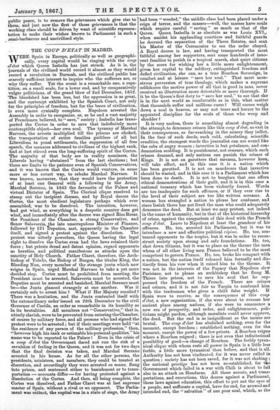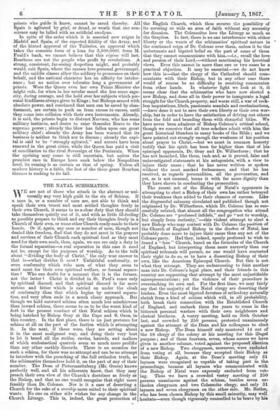THE COUP D'ETAT IN MADRID.
NVEE Spain in Europe, politically as well as geographi- cally, every capital would be ringing with the coup ,cre'tat which Queen Isabella has just struck. As it is, the journals of the civilized world record it almost as they would record a revolution in Burmah, and the civilized public has scarcely sufficient interest to inquire who the sufferers are, or why they suffer. Yet the event is a remarkable one, a repe- tition, on a small scale, for a lower end, and by comparatively vulgar politicians, of the grand blow of 2nd December, 1852. 'The bloodshed has been less, but the oppression is as great, and the centempt exhibited by the Spanish Court, not only for the principles of freedom, but for the bases of civilization, is even more cynically complete. Napoleon arrested the Assembly in order to reorganize, or, as he and a vast majority of Frenehmen believed, to "save," society ; Isabella has trans- ported the Cortes in order to save that indefinitely more .contemptible object—her own soul. The tyranny of Marshal Narvaez, the arrests multiplied till the prisons are cliched, the transportation of entire families guiltless of all but Liberalism to penal settlements, the suppression of all free speech, the menaces addressed to civilians of the highest rank, had at last stirred even the long-suffering spirit of the Cortes. 'The majority of that body are in reality nominees, the Liberals having "abstained" from the last elections ; but -there are limits to the patience even of Spanish Conservatives, and it was known that the Cortes would venture, in some more or less covert way, to rebuke Marshal Narvaez. It was known, moreover, that they would have the protection of at least one General with a following in the Army, Marshal Serrano, in 1843 the favourite of the Palace and -virtual Dictator of Spain. The Clerical clique resolved to stamp out the incipient disease, and by Royal decree the Cortes, the most obedient legislature perhaps which ever .assembled, was to be dissolved. The intention, however, lhad got wind, as everything in a despotic country does get wind, and immediately after the decree was signed Rios Roses, "the President of the Chamber, a strong Conservative, and Senor Salaverria, the late unscrupulous Minister of Finance, followed by 121 teputies, met, apparently in the Chamber itself, and signed a protest against the dissolution. The protest was utterly powerless, the Queen having the legal right to dissolve the Cortes even had the laws retained their force ; but priests dread and detest opinion, regard opponents as heretics, and political manifestoes as attacks upon the sanctity of Holy Church. Father Claret, therefore, the Arch- bishop of Toledo, the Bishop of Burgos, the titular King, the Bleeding Nun, every member of the strange junta which now reigns in Spain, urged Marshal Narvaez to take a yet more decided step. Cortes must be prohibited from meeting, the President must be arrested, Salaverria must be arrested, the beputies must be arrested and banished, Marshal Serrano must !be—the Junta glanced strangely at one another. Was it .certainly safe to arrest him What if Her Majesty recoiled ? There was a hesitation, and the Junta contented itself with the extraordinary order'issued on 28th December to the civil Governor of Castile, an order as remarkable in its humility as in its brutalities. All members not "Conservative," that is, utterly slavish, were to be prevented from entering the Chamber, ,oi course by military force, and all persons who had signed the protest were to be arrested ; but if their meetings were held "at the residence of any person of the military profession," then, -"however high his rank or estimable his personal qualities," his iname was to be reported to the Palace ! Even in the crisis of za coup d'e'tat the Government dared not run the risk of a revulsion of feeling in the Queen, and it was not for two days that the final decision was taken, and Marshal Serrano arrested in his house. As for all the other persons, the presidents, 'ministers, and members, they could be treated at discretion, and accordingly they were arrested en masse, flung into prison, and sentenced either to banishment or to trans- portation — accounts differ —for having protested against a dissolution of the Cortes. And then, all being complete, the Cortes was dissolved, and Father Claret was at last supreme master of Spain, without a rival or an opponent. The Parlia- ment was extinct, the capital was in a state of siege, the Army
had been "weeded," the middle class had been placed under a reign of terror, and the masses—well, the masses have souls which require careful " saving " as much as that of the Queen. Queen Isabella is as absolute as was Louis XVI., when amidst his applauding courtiers and faithful guards he decreed the separation of the Three Estates, and sent his Master of the Ceremonies to see the order obeyed. A Royal decree is law, and having transported the most faithful among her supporters, sent some hundreds of inno- cent families to perish in a tropical marsh, shot quiet citizens by the score for wishing her a little more enlightenment, given her capital to the soldiery, extinguished freedom and defied civilization, she can, as a true Bourbon Sovereign, in comfort and at leisure "save her soul." That most mon- strous perversion of true theology, which makes a supreme selfishness the motive power of all that is good in man, never received an illustration more detestable or more thorough. If it be the Queen's first duty to "save her soul," to see that she is in the next world as comfortable as in this, what matter that thousands suffer and millions curse ? Will curses weigh down a soul in heaven, or may not tears and horror be the appointed discipline for the souls of those who weep and shudder
It is very useless, there is something almost degrading in the attempt, to denounce crimes like this coup d'e'tat, so vast in their consequences, so far-reaching in the misery they inflict. In the face of such deeds, such cold, calculating, scientific cruelties, the strongest words the journalist can use sound like the sobs of. angry women ; invective is but petulance, and con- demnation scolding. It is punishment, not censure, which such crimes demand, and only nations can punish the crimes of Kings. It is not on garotters that sarcasm, however keen, will take effect, and in this case it is a nation which has been garotted. It is not on murderers that invective should be wasted, and in this case it is a Parliament which has been done to death. It is not to burglars that one offers ethical demonstrations of their guilt, and it is in this case a national treasury which has been violently forced. Words are too inadequate for such offences, or if they ever rise to the level of their subject are too like written screams. A woman has strangled a nation to please her confessor, and since Isaiah there has not lived the man who could adequately denounce the deed. But at least we may protest, not indeed in the name of humanity, but in that of the historical hierarchy of crime, against the comparison of this deed with the French coup d'e'tat. Leave to Napoleon at least the grandeur of his offences. He, too, arrested his Parliament, but it was to introduce a new and effective political re'ginte. He, too, sen- tenced opponents to the tropics, but it was in order to recon- struct society upon strong and safe foundations. He, too, shot down Citizens, but it was to place on the throne the man whom of all other living men France believed to be the most competent to govern France. He, too, broke his compact with a nation, but the nation itself released him formally and dis- tinctly from his vow when it raised him to the throne. It was not in the interests of the Papacy that Napoleon slew Parisians, not to please an archbishop that he flung M. Thiers into prison, not to save his soul that he sup- pressed the freedom of the French. There are crimes and crimes, and it is not fair to Turpin to confound him with the tradesman who gives a child false weight. If Spain were to receive, as the consequence of this coup d'Itat, a new organization, if she were about to resume her ancient place among nations, if she were to commence a new era of prosperity, and order, and enlightenment, poli- ticians might pardon, although moralists could never approve, the deed. But the end is as insignificant as the means are brutal. The coup d'e?.at has abolished nothing, even for the moment, except freedom ; established nothing, even for the moment, except the power of a few priests. A Bourbon reigns where a Bourbon reigned ; there is not even that infinitesimal possibility of good—a change of Bourbon. The feebly tyran- nical clique with whom rests all power in Spain is a little less feeble, a little more tyrannical than before, and that is alL Authority has not been vindicated, for it was never called in question ; society has not been saved, for it was not shaking ; the national prestige has not been re-established, for the Government which failed in a war with Chili is about to fail also in an attack on Honduras. All these arrests, and trans- portations, and executions, this decree against a Parliament, these laws against education, this effort to put out the eyes of a people, and suffocate a capital, have for end, for avowed and intended end, the " salvation " of one poor soul, which, as the priests who guide it know, cannot be saved thereby. All Spain is agitated by grief, or dread, or wrath that one con- science may be lulled with an artificial anodyne.
In spite of the order which it is asserted now reigns in Madrid and Spain, of the reported fidelity of the Army, and of the hinted approval of the Tuileries, an approval which takes the concrete form of a loan for 3,500,000/. from M. Fonld's bank, we cannot believe that this re'gime will last. Bourbons are not the people who profit by revolutions. A strong, consistent, far-seeing despotism might, and probably would, suit Spain, where the masses love personal government, and the middle classes allow the soldiery to pronounce on their behalf, and the national character has an affinity for intoler- ance; but no nation ever tolerates long a government of priests. Were the Queen even her own Prime Minister she might rule, for when in her secular mood she has some saga- city, daring courage, and the hold over her subjects which per- sonal kindliness always gives to Kings ; but Bishops armed with absolute power, and convinced that men can be saved by chas- tisement, are certain to push on from excess to excess, until they come into collision with their own instruments. Already, it is said, the priests begin to distrust Narvaez, who has some military instincts, and desire to raise Gonzalez Bravo to the supreme power ; already the blow has fallen upon one great military chief; already the Army has been warned that its business is neither to think nor to discuss ; already the capi- tal is said to be "strongly agitated," and arrests have been renewed in the great cities, while the Queen has paid a visit of conciliation to the rival Sovereign of the Peninsula. When• the uprising may come is still uncertain, but unless the proudest race in Europe have sunk below the Neapolitan level, its coming is as certain as that of spring. Unless all modern history is a fable, the last of the three great Bourbon thrones is rocking to its fall.





































 Previous page
Previous page